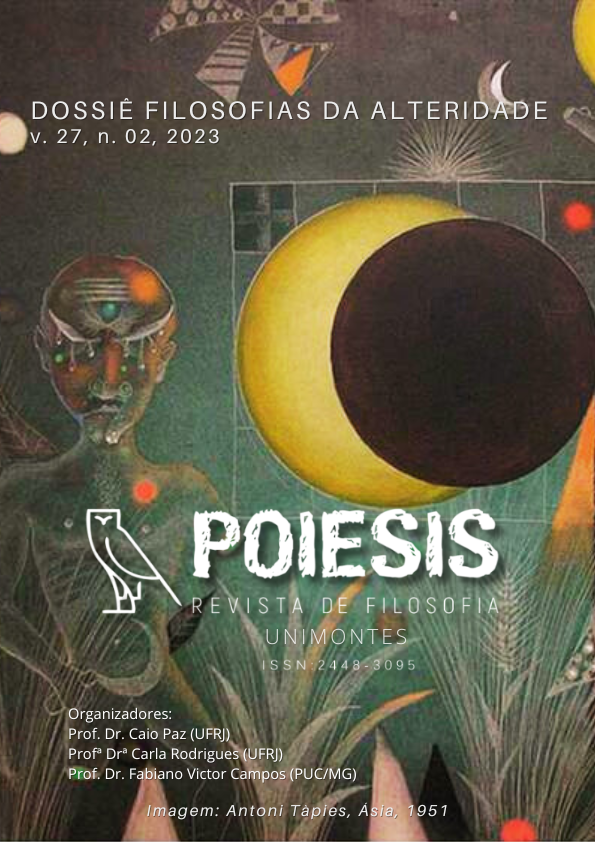“PENSAR COMEÇA TALVEZ AÍ”: DERRIDA E A QUESTÃO ANIMAL
DOI:
10.46551/2448-30952023v27n208Palavras-chave:
Derrida, Animal, Logocentrismo, LinguagemResumo
O presente trabalho busca pensar a questão acerca do animal no pensamento do filósofo franco-argelino Jacques Derrida. Partindo do pressuposto de que a tese do logocentrismo é, como afirma Derrida, antes de tudo uma tese sobre o animal, procuramos demonstrar de que maneira a desconstrução do privilégio concedido ao logos ao longo da história da filosofia no ocidente implica, como um aspecto estrutural necessário, uma certa indagação acerca do animal, como aquele vivente sempre enxergado desde a sua falta de logos. As implicações ético-políticas de uma tal indagação ficam evidentes quando pensamos a “estrutura sacrificial” que essa falta que constitui o animal representa: estar fora do logos significa, ao menos, ser um vivente reduzido à corporalidade, sendo esta entendida tão somente como disponibilidade para o exercício de um poder por parte daquele que, possuidor do logos, ascende à categoria de soberano. Tal concepção de soberania é um traço distintivo do que se chamou, ao longo de mais de dois milênios, filosofia. Por filosofia se entende, então, um certo gesto soberano de exclusão e rebaixamento do outro, seja este outro o animal, seja ele a escritura. Tal qual o animal, também a escritura é enxergada desde a sua falta de logos, desde a sua distância com relação à origem do sentido. Animal e escritura se aproximam ou se assemelham, então, aos olhos da filosofia, como a perpétua ameaça de um fora sobre o qual não é totalmente possível exercer sem perda a soberania, o que leva à sugestão de que pensar começa talvez aí.
Downloads
Referências
BATAILLE, G. Teoria da religião. Tradução: Sergio Goes de Paula & Viviane de Lamare. São Paulo: Editora Ática, 1993.
CRAGNOLINI, M. Hospitalidade (com o) Animal. In: “Jacques Derrida: entreatos de leitura e literatura”. Roberto Said, Luiz Fernando Ferreira Sá (Orgs.). Cotia, SP: Ateliê Editorial, 2014, pp. 131-146.
DERRIDA, J. O animal que logo sou. Tradução: Fábio Landa. São Paulo: Editora UNESP, 2002.
___________. Che cos’è la poesia? Tradução de Tatiana Rios e Marcos Siscar. In: Inimigo Rumor, n. 10, p. 113-116, 2001.
___________. Força de lei: o fundamento místico da autoridade. Tradução: Leyla Perrone-Moisés. São Paulo: Editora WMF Martins Fontes, 2010.
___________. “É preciso comer bem” ou o cálculo do sujeito. Tradução: Denise Dardeau e Carla Rodrigues. In: Revista Latinoamericana do Colégio Internacional de Filosofia, nº 3, 2018, pp. 149-185.
___________. Gramatologia. Tradução: Miriam Chnaiderman e Renato Janine Ribeiro. São Paulo: Perspectiva, 2006.
___________. Posições. Tradução: Tomaz Tadeu da Silva. Belo Horizonte: Autêntica, 2001.
DERRIDA, J. The animal that therefore I am. Translation: David Wills. New York: Fordham University Press, 2008.
DESPRET, V. O que diriam os animais. Tradução: Letícia Mei. São Paulo: Ubu Editora, 2021.
GONZÁLEZ, A. Una lectura deconstructiva del régimen carnofalogocéntrico: hacia una ética animal de la diferencia. In: Daimon: Revista Internacional de Filosofia. nº 69, 2016, pp. 125-139.
LLORED, P. O outro feminismo (a inventar) de Derrida: as implicações éticas e políticas do carnofalogocentrismo. In: Revista Trágica: estudos de filosofia da imanência. Tradução: Marianna Poyares e Luíza Novaes Telles Ribeiro. v. 9, nº 2, 2016, pp. 61-76.
NIETZSCHE, F. Ecce Homo. Tradução: Paulo César de Souza. São Paulo: Cia. das Letras, 1995
NIETZSCHE, F. Genealogia da moral. Tradução: Paulo César de Souza. São Paulo: Cia. das Letras, 2009.
NIETZSCHE, F. Sobre verdade e mentira no sentido extramoral. Tradução: Fernando de Moraes Barros. São Paulo: Hedra, 2008.
PRECIADO, P. “Amor no Antropoceno”. In: Um apartamento em Urano: crônicas da travessia. Tradução: Eliana Aguiar. Rio de Janeiro: Editora Zahah, 2020.
Downloads
Publicado
Como Citar
Edição
Seção
Licença
Copyright (c) 2024 Revista Poiesis

Este trabalho está licenciado sob uma licença Creative Commons Attribution-NonCommercial-NoDerivatives 4.0 International License.





.png)

